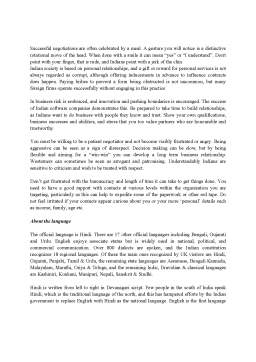Extras din referat
India is a very large and complex country. Many business people will have had western style education. The business language is English, and the country also has a similar legal and business framework to the UK.
India has a substantial middle class, a skilled workforce and an increasing purchasing power. In large cities, business meetings and entertainment are conducted as in Western countries. Indians are known for their hospitality towards strangers, and although initial business meetings are likely to be held at offices or hotels, it is not unusual for business associates to be entertained at home.
India is an ancient civilization and its people have a predominantly religious attitude to life, marked by clear authority structures and distinct social status lines. The Indian government is committed to breaking down caste differences; however, it is important to remember that certain values and attitudes enable Indians who live in extreme poverty to understand and accept their lot in life, even if it is not easy to bear. India is one of the most ethnically diverse places in the world, and its distinctive culture is the product of numerous waves of migration over several thousand years.
Business women is a relatively new phenomenon in India, and although female visitors would be treated with courtesy and respect, your contact may at first be a little uncomfortable. In such situations care needs to be taken to develop the relationship slowly.
Some cities are considered more business-friendly than others. At one business meeting we discovered that some considered one city less business friendly and did not attract the same level of investment as its equivalents in other parts of the country
Tips for a perfect business meeting
Make appointments in advance and confirm one week before arriving and once you have arrived. Arrive on time. Indians appreciate punctuality, but don't always practice it themselves.
Be prepared to spend time getting to know each other before talking business. Send any agendas and back up materials in advance, and follow up the meeting with an overview of what was discussed and the next steps.
Take plenty of business cards, and exchange these after the initial handshake. Put your title and any qualifications on your card, present it formally with either both hands or the right hand, and with your name towards the recipient so they can read it when it is handed over. Try to use your contact’s title (professor etc) when initially speaking with him/her, and when entering a meeting room greet the senior staff first.
Seating is likely to be hierarchical, and time will need to be spent on general conversation at the start of the meeting. People may tell you what you want to hear. Don't assume a smiling face means acceptance, it can also signify understanding without agreement, thereby saving face for all parties. It is often advisable to confirm agreements verbally as well as by interpreting body language. Stressing your common aims can help win round a conversation. In meetings, take plenty of time to build up trust before getting down to business. Always present your business card (you do not need to translate it into an Indian language).
It is important to maintain harmony, avoid conflict and confrontation during discussions. Mask any feelings of frustration with a smile. Negotiators tend to be sensitive to honour, ‘saving face’(izzat), dignity and self respect. It is important not to allow your host to ‘lose face’(avoid, for example, contradicting your host in public).
The most senior person will make the decisions, and if he is not at the meeting you are at the early stage of negotiation. Decision making can be a slow process. Don't lose your temper as that means you lose face and are seen as untrustworthy. Hierarchy and status can have a profound impact on decision-making, with the decisions usually left to a senior colleague in the organisation who is often a significant family figure. A contact may need to refer his/her findings further up the organisational hierarchy. In meetings subordinates would usually not question, contradict or interrupt a senior colleague, and in an office environment may even stand when the boss enters the room.
The hierarchical nature of Indian society demands that the boss is recognized as the highest individual in authority. When establishing business contacts, aim for those in the highest position of authority since decisions are made only at this level. In any event, you will often find that subordinates are reluctant to accept responsibility. Sometimes a meeting can be prolonged as the other person is on the phone.
Concessions are expected in price and terms, so you can expect them in return. Concentrate on building rapport, and do not be confrontational or forceful nor disagree in public with other people on your team. Indians will accept your word as your bond. Politeness, praise and respect are important and avoid making Indians feel hurried, as they don't like to say ‘no’. In Indian culture a direct “No” can be seen as rude so silence or “we will try” may be used instead.
Preview document
Conținut arhivă zip
- Cultura in India.doc













